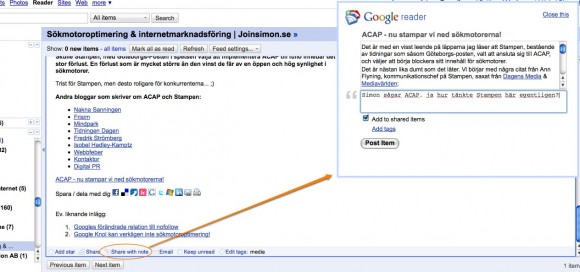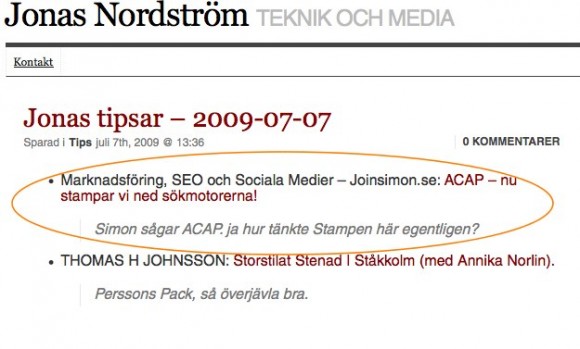I kategorin Tips så delar jag med mig av intressanta inlägg som jag hittat via mina RSS-flöden i Google Reader.
Det finns flera andra som har liknande funktion på sina bloggar, de använder då exempelvis FeedWordPress, SharedItems2WP eller WP-o-Matic. Av olika anledningar passade ingen av dessa lösningar mig perfekt, mest för att jag ville ha full kontroll över flödet och för att det var så länge sen jag programmerade i perl …
Som jag nyss avslöjade, så skrev jag alltså ett perl-script som hämtar min shared items-feed från google reader (via XML::Atom::Syndication::Feed) och sen trycker jag in en post med de senaste bloggtipsen i WordPress (via XMLRPC::Lite).
Effekten blir den här.
Gå till Google reader, hitta ett intressant inlägg och välj ”Share with note”.

Lägg till en anteckning och spara.
Kör sen perlscriptet gr2wp.pl (Google Reader To WordPress).
Då skapas ett WP-inlägg med alla nya utdelade bloggposter.

Här kommer perlscriptet. Du får gärna använda och modifiera det helt fritt. Jag har utgått från ett script som postade google-reader shared items till delicious.
#!/usr/bin/perl -w
use strict;
use LWP::Simple;
use XML::Atom::Syndication::Feed;
use XMLRPC::Lite;
use XML::XPath;
use WordPress::XMLRPC;
use HTML::Entities;
use Time::Local;
######## CONFIGURATION ########
my $debug = 0;
# Your Google Shared Items Feed URL
my $feed_url = 'yourgoogleshareditemsfeedurl';
# A local file location for the feed
my $feed_file = '/path/to/localfeedfile.xml';
# Timestamp file
my $ts_file = "/path/to/gr2wp_timestamp.lis";
# WordPress post title
$wp_title = "post title";
# WordPress post categories (example: ['Fashion','Beauty'])
# (The categories must exist before posting)
@wp_categories = ['category'];
# WordPress user
$wp_user = 'username';
# WordPress password
$wp_pwd = 'password';
# WordPress proxy (URL to xmlrpc.php, don't forget to activate xmlrpc protocol in blog!)
$wp_proxy = 'http://sitename/xmlrpc.php';
######## END CONFIGURATION ########
# start time handling
my @now = localtime;
my $time = timelocal(@now);
# Subtract one week (default if no timestamp file found)
my $default_start = $time - 7 * 24 * 60 * 60;
my $start_date;
# fetch last startdate or, if not found, pick a date one week ago
if (-e $ts_file) {
open FP, "<$ts_file" or die "Could not open file $ts_file: $! \n";
$start_date = ()[0];
close FP;
chomp $start_date;
$start_date =~ s/\s//g;
} else {
$start_date = $default_start;
}
print "Start date: ", $start_date, "\n" if $debug;
print "now: ", $time, "\n" if $debug;
# Set the google reader namespace URI
my $gr = 'http://www.google.com/schemas/reader/atom/';
#snag a local copy of the shared items feed
my $status = getstore($feed_url,$feed_file);
die "Error $status fetching the Google Reader feed." unless is_success($status);
# Init the wordpress API
my $o = WordPress::XMLRPC->new({
username => $wp_user,
password => $wp_pwd,
proxy => $wp_proxy,
});
#parse the shared items feed
my $feed = XML::Atom::Syndication::Feed->new($feed_file);
my @entries = $feed->entries;
# loop through items in the feed
my $buf = "- ";
my $post_count = 0;
foreach my $entry (@entries) {
# grab the title, link, and source title
my $postTitle = encode_entities($entry->title->body);
my $postLink = $entry->link->href;
my $sourceTitle = encode_entities($entry->source->title->body);
# get the time this item was shared
my $shareTime = $entry->get_attribute($gr,'crawl-timestamp-msec');
# convert from milliseconds to seconds
$shareTime = $shareTime/1000;
# skip item if it was shared before the start date
next if $shareTime < $start_date;
$post_count++;
#grab any notes
my $xp = $entry->as_xml;
# get the notes, this should probably be simplified ...
my $notes = encode_entities($1, "\200-\377")
if $xp =~ m/annotation>(.*?)<\/content>/;
# Remove the "CDATA" bit, if present
$notes = $1 if $notes =~ m//s;
print "Title: $postTitle\n" if $debug;
print "Link: $postLink\n" if $debug;
print "Source: $sourceTitle\n" if $debug;
# Create the post content
$buf .= "
- $sourceTitle: $postTitle "; if ($notes) { $buf .= "
"; $buf .= "$notes"; $buf .= ""; } } $buf .= "
För enkelhetens skull kör jag perl-scriptet en gång om dagen, via crontab.
